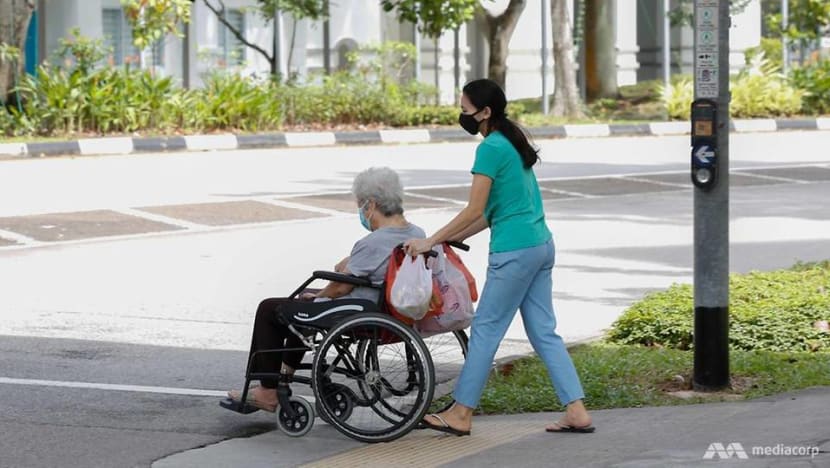Singapore maid agencies welcome proposed Indonesian law protecting its domestic workers
Tabled 19 years ago, the proposed legislation is now a priority for the Indonesian government.

A domestic worker with an elderly person in Singapore. (File photo: TODAY/Illi Nadhirah Mansor)
SINGAPORE: Employment agencies in Singapore have welcomed a proposed law by Indonesia aimed at offering better protection for its domestic workers.
If passed, the Domestic Workers’ Protection Bill will introduce standardised minimum wages and protection from mistreatment. Tabled 19 years ago, the proposed legislation is now a priority for the Indonesian government.
The Indonesian government is urging the acceleration of the ratification of the Bill after President Joko Widodo publicly endorsed it.
According to Indonesia’s Cabinet Secretariat site, there are about 4 million Indonesians who are domestic workers. There were reportedly about 120,000 Indonesians working in Singapore as helpers as of 2020.
MOVE IN THE RIGHT DIRECTION
Two maid agencies in Singapore said this is a move in the right direction.
“The ratification of the law is a good step. It’s a step in the right direction and the impact on the industry or employment of migrant workers should be a positive one,” said Mr David Bensadon, managing director of We Are Caring Agency.
“Every scene that is set up and implemented to enforce the safety of workers goes in the right direction.”
Similarly, Mr Ryan Ng, managing director of Master Employment Agency, said that “proper recognition and protection” will be good for the long-term sustainability of hiring migrant domestic workers.
“That said, the measures should be fair, and not penalise or inconvenience any good employers of Singapore, and also not to jeopardise good helpers who are in need of a job to support their family,” he said.
DEALING WITH CHANGES
If there were to be changes for maid agencies in Singapore, Mr Ng said he hopes that firms like his will receive support from the Government.
“If there is a lot of additional paperwork or manpower that is required, I hope that the Government will also (give) support in this role,” he said.
“Because as small organisations, SMEs, we often face a shortage of manpower, and we do not have the financial resources to employ people just to be able to comply if there are too many specific measures in place,” he said.
Mr Bensadon noted that for the bill to result in real changes on the ground, coordination between the governments of both Singapore and Indonesia is needed.
Some past policy changes were not communicated and implemented smoothly, he said, citing the example of Indonesia in 2018 imposing a performance bond of S$6,000 on Singapore employers who hire Indonesian maids.
The Singapore Government had said then that the bond was unnecessary because Singapore has a comprehensive set of regulations to protect foreign domestic workers.
More than regulations, Mr Bensadon added that employers and agencies could play a bigger role in improving relationships with helpers.
“A part of what we do is triggered by regulations, another part is triggered by our own practices,” he said. “We have a lot of possibilities to improve relationships by communicating more with our helpers, our employers, and trying to align expectations.”


















